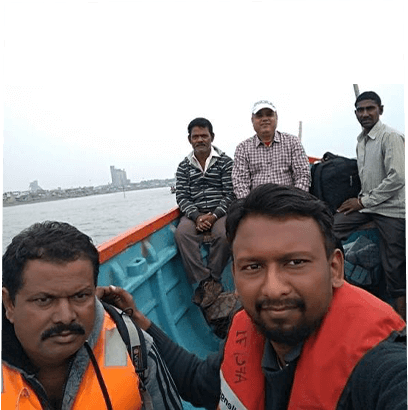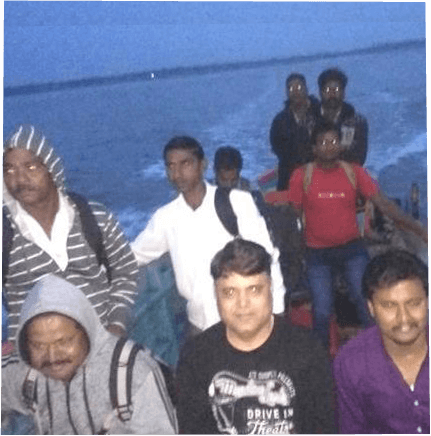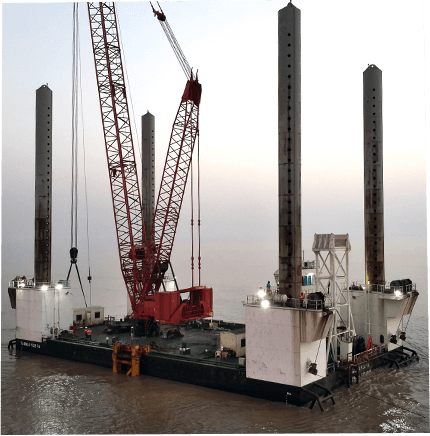
How the Samrat Jackup was Saved!
Back in December 2017, Cyclone Ockhi was not even remotely expected to reach Gujarat. In fact, on 1st December 2017, when the storm was ravaging Lakshadweep, the Gujarat Maritime Board gave the clearance for ‘Samrat’ jack-up, which was parked at Dahej waters, to be wet towed to ‘Chhara’ Port - 170 Nautical Miles away.
A team of 8 Afconians was entrusted with the task. After successfully handing over the tow to the captain of the towing tug boat on the evening of 2nd December, they reached Chhara Site location by road at 7pm on 3rd December to receive Samrat. The estimated towing time was 32 hours.
Leading the team of 8 was Sanjay Sanwal, Senior Manager (CPE). The other team members were P Sivanantham, Senior Engineer, CPE (Chhara Site), Vikas Walunj, Engineer, CPE (Samrat), Sanjay Jagtap, Barge Operator (HO-SCS), Manohar Sitaram, Mechanic (HO), Raghunath Mahato, Welder, JNPT Site, Mohammad Jahur, Helper. JNPT Site, and Madhukar Kalu, Helper, JNPT Site.
The journey from Dahej to Chhara was uneventful. However instead of 32 hours the Samrat reached the outer area of Chhara in 46 hours at 6am on 4th December. Because of the natural contours of the shore-bank, Samrat could not be brought closer than 1.6 kms from the shoreline. For jacking up, a spot where the depth was consistent for all four spuds was needed. Sanjay and team boarded Samrat for this task at 7am.
By now, the cyclone warning had been sounded and it was a race against time, and the sea was turning rough. The tug boat kept moving Samrat while trying to find the ideal spot. By 1pm, the waves were at a height of 3 meters and breaking over Samrat. The team ensured that everyone stayed away from the railings where they could get pulled overboard.
In all the chaos, due to the force of the waves, the jacking pins for spud locking failed. The diesel supply in the Power Generators also got obstructed and rendered the generators unusable. In turn, this corrupted the automated jacking system due to sudden power failure. Further to add to their woe, the locking pin pump of one of the power packs also failed.
To add to the stress, the Captain of the tug boat kept pressurising the team to release the tow as his craft was getting strained every time Samrat was tossed by the waves. Finally at 8pm the tug boat was allowed to disconnect the tow. Samrat was now at the mercy of the waves and the courage of the Afcons team.
There was one bright spot in all of this - when the tug boat captain disconnected the Samrat, he assured Sanjay that Samrat was over a level bed with a depth of 18 meters. By that time they could succeed in lowering the spuds by 23 meters, but platform was still in floating condition.
In pitch darkness and amidst the worsening weather, the team first addressed the power failure. They did a commendable job to get the generator started. Then, they worked on refitting a new locking pin pump and replaced the damaged locking pins. Because of their tireless effort and against all odds, finally at around 12am on 5th December, Samrat was brought to a jacking position and moored (as platform was still in floating condition). At 12.30am, all the 8 team members were ready to be evacuated onto the boat that had brought them. Amidst an angry sea, Sanjay’s naval training was an asset in the whole process.
On 6th December, when the storm subsided, the team boarded Samrat once again, and brought the vessel to a full working mode. This heroic effort Is a testimony to how Afconians put their heart and soul in everything they do while ensuring that they overcome every difficulty on the way. Let’s salute the exemplary courage and dedication of these 8 brave hearts!







